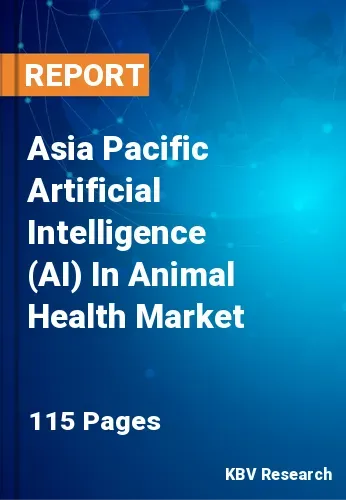The Asia Pacific Artificial Intelligence (AI) In Animal Health Market would witness market growth of 18.9% CAGR during the forecast period (2023-2030).
Veterinarians can now diagnose a wide range of illnesses and issues affecting animals with greater precision and efficiency due to the application of AI in animal health. Medical imaging such as X-rays, MRIs, and ultrasounds can be analysed by AI-powered diagnostic tools with phenomenal accuracy, enabling early detection and prompt therapies. This has not only led to better health outcomes for animals but has also reduced the burden on medical centers and veterinarians.
AI has also advanced the development of individualized animal care routines. AI systems may find patterns and trends in vast amounts of genetic data and animal health records, enabling customized treatment solutions adapted to the unique requirements of each animal. This degree of customization has enhanced therapy effectiveness and reduced the possibility of adverse reactions to drugs.
Additionally, using AI-powered wearables and remote monitoring tools has made it possible to track an animal's health continuously, even when it's not in a clinical environment. Real-time monitoring provides prompt detection of potential health issues and rapid response, improving overall animal welfare in the entire procedure.
The demand for innovative animal healthcare solutions is substantial due to the large population of livestock and pets. The need for superior veterinary services has increased as a result of increased pet ownership and an increase in urbanization. Governments in the region have implemented supportive regulations and initiatives that encourage AI integration in the veterinary industry as they realize the importance of modernizing agriculture and improving animal healthcare. Significant investments have been made in AI-driven livestock management and veterinary services solutions due to the Chinese government's support of technological innovation and digital transformation. AI technologies are used to improve disease surveillance in farms, monitor animal health, and optimize breeding programs, which increases agricultural productivity and sustainability.
The China market dominated the Asia Pacific Artificial Intelligence (AI) In Animal Health Market by Country in 2022, and would continue to be a dominant market till 2030; thereby, achieving a market value of $275.8 million by 2030. The Japan market is estimated to witness a CAGR of 18.1% during (2023 - 2030). Additionally, The India market would register a CAGR of 19.6% during (2023 - 2030).
Based on Animal type, the market is segmented into Companion Animal, and Production Animals. Based on Solutions, the market is segmented into Hardware, and Software & Services. Based on Application, the market is segmented into Diagnostics, Identification, Tracking, & Monitoring, and Others. Based on countries, the market is segmented into China, Japan, India, South Korea, Singapore, Malaysia, and Rest of Asia Pacific.
Free Valuable Insights: The Worldwide Artificial Intelligence (AI) In Animal Health Market is Projected to reach USD 3.6 Billion by 2030, at a CAGR of 18.1%
The market research report covers the analysis of key stake holders of the market. Key companies profiled in the report include Zoetis, Inc., Merck & Co., Inc., Heska Corporation (Antech Diagnostics, Inc), SignalPET, LLC, VetCT Specialists Limited, Veterinary Imaging Center of San Diego, Inc (Vetology), OneCup AI, Petriage, ImpriMed, Inc., and IDEXX Laboratories, Inc.
By Animal type
By Solutions
By Application
By Country

Our team of dedicated experts can provide you with attractive expansion opportunities for your business.

